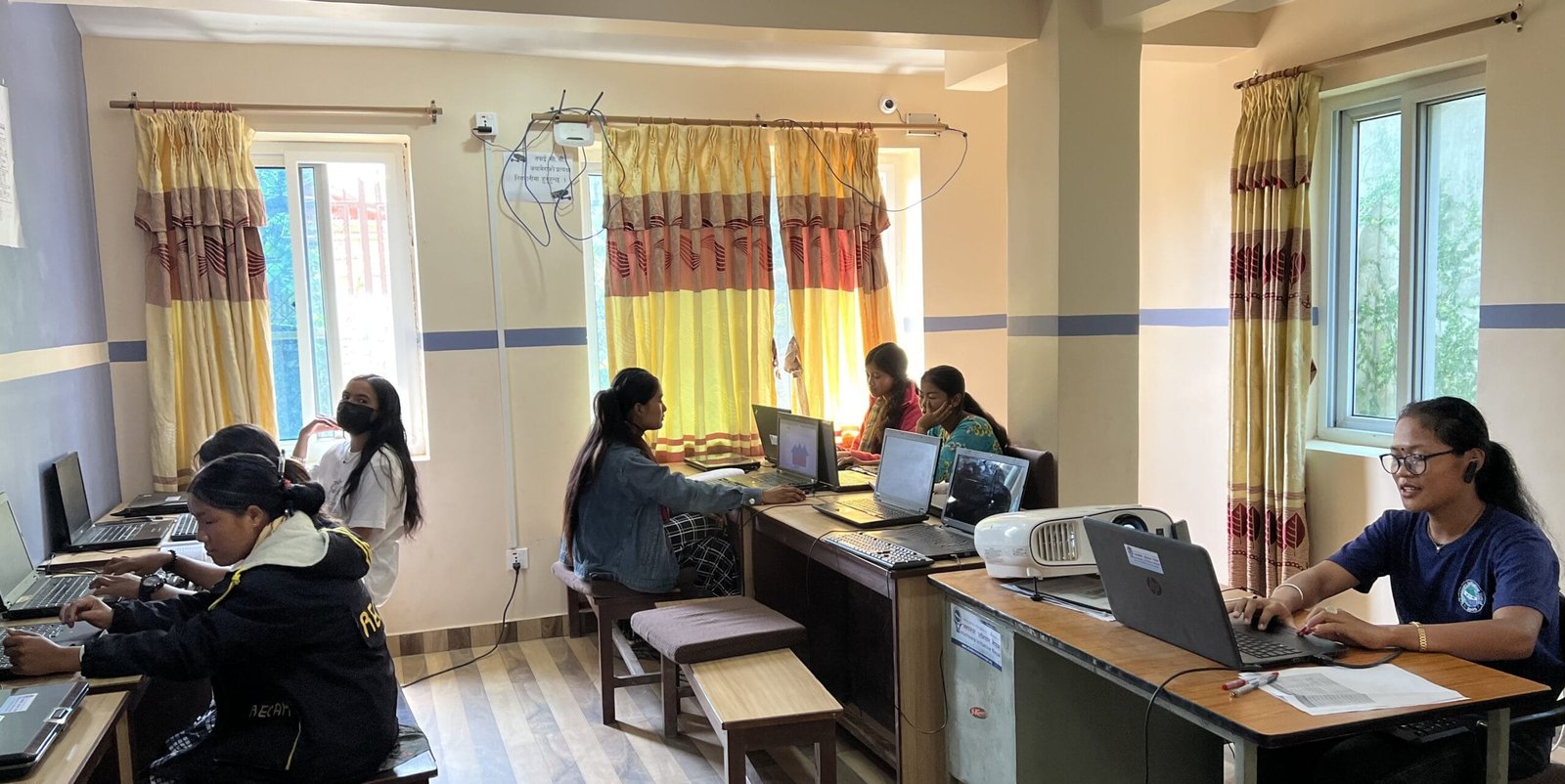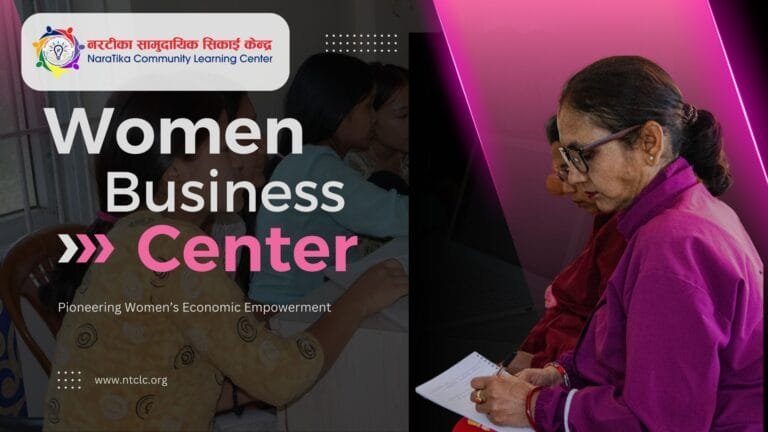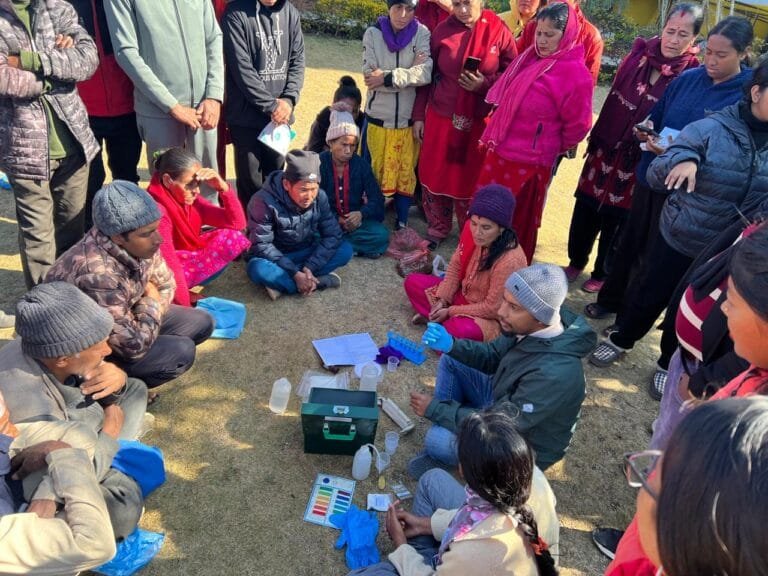In the remote mountainous landscapes of Nepal, digital literacy often feels out of reach. However, a new era is dawning in Okhaldhunga—a district renowned for its hills, forests, and vibrant agricultural communities. Thanks to the visionary efforts of NaraTika Community Learning Centre (NTCLC) and Volunteers Initiative Nepal (ViN), a computer lab has finally opened. This milestone marks the first in this rural region, making modern technology accessible to children, youth, and adults eager to acquire computer skills. This learning center has the potential to transform countless lives and uplift entire communities by empowering locals with the knowledge and tools to thrive in the digital world.
In this article, we’ll explore the journey of establishing this innovative computer training center, the variety of programs offered, and how local residents are already benefiting. Along the way, we’ll share stories of hope, highlight relevant data, and provide insights into how you can engage with ViN’s mission. Keep reading to discover why the computer lab in Okhaldhunga marks an educational turning point and what the future holds for this new digital learning hub.
Highlights Table: Key Features of the Okhaldhunga Computer Lab
| Feature | Details |
| Establishment | Founded under NaraTika Community Learning Centre (NTCLC) in partnership with Volunteers Initiative Nepal (ViN), becoming the first computer lab in Okhaldhunga |
| Location | Nishankhe, Okhaldhunga—a rural district in eastern Nepal |
| Primary Focus | Providing computer skills training, digital literacy, and advanced computing lessons to local youth, teachers, women, and community members |
| Facility Setup | Well-equipped computer training center with reliable electricity, internet connectivity, 10+ computers, and seating for up to 20 learners at a time |
| Programs Offered | Basic to advanced computer courses; digital literacy classes; software workshops; practical sessions on hardware basics; job-oriented courses; specialized coaching for teachers |
| Staff & Volunteers | Local instructors trained by ViN to ensure program sustainability; additional support from international volunteers bringing specialized IT skills |
| Target Beneficiaries | Students, teachers, housewives, unemployed youth, small-business owners, community leaders, and older adults seeking essential computer skills |
| Achievements So Far | Over 500 community members—including youth, teachers, and women—have acquired basic to advanced computer competencies since opening |
| Sustainability Model | Training local people as instructors, encouraging a pay-it-forward approach to maintain the lab, bridging the local digital gap sustainably |
| Future Plans | Expand the computer lab into a larger computer education center with specialized courses, a computer resource center for research, and improved infrastructure (e.g., solar backups, additional machines, or a secondary “satellite” lab) |
| Contact & More Info | Visit www.ntclc.org or connect with Volunteers Initiative Nepal to learn more about volunteering, internships, or donations |
Okhaldhunga’s First Step Toward a Digital Future
Why a Computer Lab in a Remote Location?
Okhaldhunga, nestled in the rural hills of Nepal, is often characterized by challenging terrain and limited infrastructure. Many villages lack consistent electricity or internet access, and teacher training resources remain scarce. According to a 2021 UNESCO report on Nepal’s educational landscape, rural students disproportionately miss out on technology-based learning—falling behind peers in cities with daily computer exposure.
Establishing this computer lab in Okhaldhunga is a game-changer. By bridging the digital divide, the learning center:
- Increases Employability: With digital skills, residents can compete for better-paying jobs or freelance opportunities.
- Boosts Teaching Quality: Teachers trained at the lab can incorporate tech tools into lesson plans, inspiring new learning methods for their students.
- Elevates Local Entrepreneurship: Micro-entrepreneurs can leverage e-commerce and digital marketing to expand businesses beyond the local marketplace.
- Empowers Women and Girls: Through digital literacy, women with household tasks that might otherwise be bound can gain confidence and independence.
The NaraTika Community Learning Centre Vision
NaraTika Community Learning Centre (NTCLC) is founded on the principle that education is the cornerstone of sustainable development. By adding a computer training center to its existing programs—ranging from literacy workshops to vocational courses—the center aims to make the digital realm accessible to all. Collaboration with Volunteers Initiative Nepal (ViN) ensures global support, experienced volunteers, and proven program models that have already succeeded in other parts of Nepal.
An Inside Look: From Digital Literacy to Advanced IT Skills
Basic Computer Courses
For many in Okhaldhunga, switching on a computer or using a mouse is an unfamiliar experience. Hence, the lab’s primary focus starts with fundamentals:
- Introduction to Hardware: Identifying components like the CPU, monitor, keyboard, mouse, and their functions.
- Essential Software Use: Opening and saving files using word processors, web browsers, and basic utilities (e.g., PDF readers).
- Internet Navigation: Teaching how to search for information, use email, and follow safe browsing practices.
In under a month, newbies can master enough digital literacy to type documents, check email, or use social media responsibly, all thanks to this new computer literacy center approach.
Advanced Programs
As demand grows, the lab offers advanced classes for more experienced learners:
- Office Productivity Suite: Tools like Microsoft Excel, Word, and PowerPoint for day-to-day office tasks.
- Graphic Design Basics: Learning software such as Photoshop or Canva for local enterprise promotion.
- Programming Fundamentals: Introduction to coding languages or web development for youth eager to explore IT careers.
- Data Entry & Freelancing Skills: Monetizable tasks that help unemployed individuals or stay-at-home spouses generate income online.
Certified instructors and volunteers with specialized IT backgrounds regularly lead these sessions, ensuring that Okhaldhunga’s budding professionals receive top-tier guidance.
Special Focus on Teachers
Since teachers shape young minds, equipping them with robust digital knowledge sets off a chain reaction:
- Interactive Lessons: They learn to integrate computer-based presentations, videos, or digital quizzes, making classroom sessions more dynamic.
- Teaching Tools: The lab provides tutorials on digital grading, student progress tracking, or e-learning platforms.
- Pedagogical Exchange: Teachers can share best practices and resources through an internal computer workshop, collectively uplifting the district’s academic standards.
Real-Life Transformations: Stories from the Lab
Padma’s Journey from Zero to Tech Hero
Padma, a 32-year-old mother of two, had never touched a computer until she enrolled in an introductory digital literacy course at the computer learning center. Initially nervous, she gradually mastered tasks like navigating search engines and composing emails. Today, she runs a home-based craft business, marketing her goods via social media—something she never dreamed possible. “The lab gave me confidence. I now see a future where my children and I can thrive,” says Padma.
Santosh’s Leap into Teaching with Technology
Santosh is a primary school teacher who recognized a gap in his education. He joined the computer training center with minimal prior experience. After four months of advanced lessons, Santosh introduced interactive slides into his classroom. He’s also using online resources for lesson planning. “My students are more engaged, and it’s easier to demonstrate topics using images or short videos,” Santosh notes.
Leveraging Digital for Social Outreach
A group of local youth leaders who frequently volunteer in community health initiatives now harness the internet for better outreach. They create digital posters, distribute them on social networks, and manage email lists to coordinate events more effectively. Their public health campaigns—on topics like hygiene, safe drinking water, or immunizations—have a broader, more efficient reach, all thanks to the new technology learning center.
Facility Highlights: What Makes This Computer Lab Stand Out
Sustainable Technology Infrastructure
Operating a computer lab in a mountainous region has challenges—irregular electricity, potential internet interruptions, and costly repairs. The center addresses these by:
- Energy Solutions: Using backup generators or solar panels to ensure minimal downtime.
- Durable Equipment: Select robust machines capable of enduring the local climate and occasional voltage fluctuations.
- Maintenance Protocols: Training local staff in routine upkeep and troubleshooting, reducing reliance on external technicians.
Collaborative Learning Spaces
The lab is designed to accommodate up to 20 learners at a time, featuring:
- Comfortable Workstations: Sufficient legroom, ergonomic seating, and well-lit areas to reduce eye strain.
- Group Discussion Zones: Tables for small-group collaborations or question-and-answer huddles.
- Demonstration Screen: A larger display for instructors to show live demos or walkthroughs, making the learning more inclusive.
Offline & Online Resources
Recognizing the variability of internet connectivity, the computer resource center ensures:
- Local Server Libraries: Offline educational materials, from e-books to interactive simulations, are stored on local servers.
- Community Partnerships: Collaboration with local or national e-learning repositories to bolster the selection of research resources, training modules, or tutorial videos.
- Paper-Based Manuals: Step-by-step handouts for novices who prefer referencing printed text, bridging the gap for older or less digitally inclined learners.
Statistics & Data: Why a Computer Education Center is Crucial
- Nepal’s Computer Literacy Gap: According to Nepal’s Ministry of Education, only about 30% of secondary school teachers in rural regions have moderate to advanced computer skills.
- Impact on Youth: A 2022 UNESCO study indicated that digital literacy can increase youth employability by 35% in developing regions.
- Global Perspective: The World Bank has emphasized that every year of quality education—especially with digital integration—can raise a child’s future income by over 10%.
- Local Impact: In just one year, more than 500 individuals in Okhaldhunga have received basic to advanced computer training at this lab, significantly boosting overall community tech awareness.
Seven Frequently Asked Questions (FAQs)
Can the computer lab only for students, or can adults and seniors also join?
The lab welcomes everyone—youth, teachers, homemakers, small-business owners, or retirees. There’s no age limit. If you want to learn, we’re here to teach you.
What courses are available at the computer training center?
We offer an extensive range of programs, including basic computer literacy, internet fundamentals, office productivity, multimedia, coding introductions, hardware maintenance, and advanced software usage. Our programs continue evolving based on community needs.
How long do the training sessions last?
The length depends on each course. Basic classes run roughly 2-4 weeks, while advanced modules can last 2-3 months. We also host short weekend workshops on specific topics like social media marketing or graphic design.
How does the lab remain sustainable in such a remote location?
Sustainability is key. We train local instructors, rely on partial course fees or donations, and implement a robust maintenance routine. Thus, the center doesn’t rely solely on external staff or perpetual foreign funding.
Do I need prior experience to enroll?
No prior experience is required. Each course is tailored to skill levels—total newcomers start with the basics, while advanced learners can jump into specialized tracks.
Are there volunteer or internship opportunities for those with IT backgrounds?
Absolutely. Through our partnership with Volunteers Initiative Nepal (ViN), we welcome volunteers or interns worldwide. You can help teach, refine curriculum, or even troubleshoot hardware.
How do I register or donate equipment to the digital learning center?
Visit www.ntclc.org or contact ViN directly. We accept donations of functional laptops, desktops, or accessories. Monetary gifts also help cover operational and expansion costs.
Building a Lasting Impact in Okhaldhunga
Empowering Women through Computer Literacy
In many rural communities, women face additional barriers to formal employment or advanced education. By learning fundamental and advanced computer skills, they can pursue new revenue streams—like online freelancing or micro-entrepreneurship—and break cycles of dependence. For instance, some women in Okhaldhunga have begun managing household finances in Excel, creating small e-business pages, or even teaching other women how to type documents in Nepali.
Local Businesses and Technology Uplift
Shops, small tourism ventures, and regional agricultural cooperatives benefit from digital literacy, too. With basic design know-how, a shop owner can create digital flyers for local events, or a tour guide can maintain a simple website or social media account, attracting visitors from beyond Okhaldhunga. Over time, this synergy enhances the local economy’s resilience, showcasing how a single computer lab can catalyze widespread socio-economic growth.
Facilitating E-Governance
Even local governance stands to improve. From digital record-keeping to direct communication with central bodies, E-governance initiatives become feasible when local council or municipality employees know how to utilize email, official websites, and data management tools. This fosters transparency and efficiency, bridging the gap between rural communities and higher-level administrative units.
Collaborating with a Broader Education Ecosystem
Partnerships with Schools
A key objective is to integrate the lab’s resources into academic calendars. Teachers can plan assignments or group projects that require digital research by offering scheduled lab hours for local schools. Doing so ensures students don’t just learn about computers theoretically—they get hands-on practice. Over time, this will help standardize digital education across Okhaldhunga’s institutions.
Liaising with NGOs and Government Agencies
Beyond schools, the computer lab engages with NGOs focusing on skill development, women’s empowerment, and youth leadership. Through collaborative projects:
- Seminars and Workshops: Co-hosting advanced courses (e.g., digital marketing for small businesses, data analytics for non-profits).
- Outreach Initiatives: Mobile “digital literacy drives” to neighboring villages, using portable devices or short training modules for those who can’t travel to Nishankhe.
- Grant Funding: Joint proposals for national or international grant support, ensuring continuous equipment upgrades and scholarship opportunities for marginalized learners.
Championing Digital Literacy: The Role of ViN
Why Volunteers Initiative Nepal?
Volunteers Initiative Nepal (ViN) has long recognized education as a development pillar. Their belief in local empowerment led them to assist NaraTika Community Learning Centre establish the region’s first computer education center. Through consistent fundraising, volunteer recruitment, and pedagogical support, ViN ensures local ownership of the project, training local instructors who remain behind long after volunteers return home.
Volunteer Expertise
International volunteers bring specialized know-how, from software engineering to IT infrastructure design. By training local staff, these volunteers accelerate the center’s ability to offer advanced courses. The cross-cultural exchange fosters creativity, introducing fresh perspectives on technology’s role in everyday life.
A Collaborative Network
ViN’s broad network across Nepal also helps direct more resources or potential partnerships toward the IT training center. This synergy often means quicker scaling and diversified program offerings—like a coding boot camp or a digital marketing workshop, depending on local interest.
Sustaining Momentum: Plans for the Future
Expanding the Infrastructure
The center hopes to purchase more computers to meet growing demand, perhaps even establishing a second computer lab or “satellite” set up in a neighboring village. Solar power or alternative energy sources can bolster reliability, ensuring consistent operation during monsoons or power cuts.
Refining Curriculum
While the initial focus is on general digital literacy, advanced interest areas continue to emerge:
- Computer Science Lab Approach: Offering short modules on fundamental programming or robotics to spark youth interest in technology careers.
- Computer Workshop Series: Practical sessions on hardware assembly, troubleshooting, or simple device repairs, valuable for aspiring technicians.
Building a Community Tech Ecosystem
Eventually, the lab aims to evolve into a computer resource center—a hub where individuals research business ideas, children play educational games, and youth gather for hackathon-style events. By forging synergy between local governance, academic institutions, NGOs, and private sector players, the entire region can flourish in the digital age.
Voices from the Community
“I never imagined I’d be able to teach with a projector and digital slides. My students are more curious now. They want to see how technology works, which makes them pay more attention in class.”
— Kamala, a local high school teacher turned advanced user
“Learning Excel changed how I track my small store’s stock. My budgeting is clearer, and I can see month-to-month patterns. It’s almost like magic!”
— Gopal, small store owner near Nishankhe
“When I started, I was scared even to click anything. But the teacher said, ‘No fear, just try!’ Now I chat with my cousin abroad and even read news online.”
— Aarti, a 17-year-old student
Practical Tips for First-Time Learners
- Start with the Basics: Don’t be intimidated by advanced software. Learn how to turn on a computer, navigate the desktop, and understand file structures first.
- Ask Questions: Our instructors encourage curiosity. Each question, no matter how simple, moves you closer to proficiency.
- Practice Regularly: Repetition cements knowledge. If you can, spend a few minutes every day reviewing or practicing new tasks.
- Use Real-Life Projects: Need to write a letter? Try Microsoft Word. Want to tally household expenses? Explore Excel. Actual tasks accelerate learning.
- Collaborate with Peers: Group study fosters mutual reinforcement. Teach a friend a newly mastered skill to solidify your understanding.
The Wider Context: Contributing to Nepal’s Digital Revolution
Nepal’s government has increasingly recognized the importance of digital transformation. From e-governance to telemedicine, the scope of technology is vast. However, bridging the rural-urban digital gap remains a pressing challenge. By establishing a robust computer training center in a remote area, Okhaldhunga’s experience serves as a microcosm of what can happen nationwide. If replicated widely, local computer labs can speed up Nepal’s stride toward modernization—one community at a time.
Challenges and How We’re Overcoming Them
- Power Stability: Sporadic electricity can disrupt classes.
- Solution: Portable generators, solar backups, and scheduling classes during known stable power hours.
- Internet Constraints: Rural broadband or 4G coverage might be weak.
- Solution: Partnerships with telecom providers, installation of signal boosters, or offline content caching.
- Resource Funding: Upfront hardware, software licenses, and maintenance costs can be high.
- Solution: Local fundraising, grants from NGOs, minimal training fees for those who can afford, plus donations from well-wishers or corporations.
- Skepticism Among Elders: Some older community members may doubt the relevance of technology.
- Solution: Demonstrating tangible benefits—like paying bills online and cheaper communication with family abroad—reduces skepticism and fosters acceptance.
The Chain Reaction of Knowledge Transfer
One of the lab’s standout achievements is the way newly skilled individuals pass on knowledge:
- Peer-to-Peer: Students who finish an Excel module might teach neighbors how to track daily finances.
- Teacher Mentoring: Skilled teachers help less-experienced colleagues incorporate tech into lesson plans.
- Women Empowering Women: A group of female graduates, having learned social media marketing, show other women how to promote handicrafts online, thereby forming small home-based cooperatives.
This chain reaction ensures the lab’s impact grows exponentially without significant expansions or continuous external input.
Potential Collaborations: From Local to Global
Corporate Social Responsibility (CSR)
Businesses in Nepal or overseas could sponsor entire training programs, supply hardware upgrades, or finance scholarships for deserving students. For companies seeking an impactful CSR project, investing in a rural computer science lab fosters real-world transformations.
International Universities or EdTech Firms
Academic institutions abroad might share free software licenses or set up e-libraries for remote collaboration. Partnerships with EdTech companies can yield advanced e-learning modules tailored explicitly to Nepal’s socio-cultural context.
Governmental Linkages
Regional government bodies could use the lab to train local staff or roll out e-governance pilot projects. This synergy would strengthen public services and fuel further infrastructural developments in Okhaldhunga.
Sustaining Enthusiasm: Milestones and Celebrations
Certificate Days
After completing each training cycle, the center hosts a modest graduation ceremony. Students receive a recognized certificate from the computer training center, boosting their resumes and sense of accomplishment. Families and friends gather to applaud, turning it into a community-wide celebration.
Open Houses
Twice a year, the technology learning center invites visitors to see demos of new modules. Young coders might showcase a simple website, or adult learners present their newly acquired digital marketing strategies. This fosters a sense of excitement, encouraging prospective learners to sign up.
Social Media Testimonials
Graduates often share short video testimonials or success stories online. These personal accounts help build broader awareness, leading to fresh volunteer sign-ups or new donors. The positivity resonates far beyond Okhaldhunga’s hills.
Conclusion: A Bright Digital Dawn in Okhaldhunga
The emergence of the computer lab under the auspices of NTCLC and ViN is more than just a local development—it’s a symbol of hope and progress for a historically underserved region. The project’s ripples are being felt across families, schools, and local businesses, from bridging the digital divide to boosting employability and educational quality. Each newly trained individual contributes to a collective transformation, demonstrating how the synergy of passion, technology, and community spirit can break barriers once deemed insurmountable.
We invite you to be part of this life-changing venture. Whether you’re a seasoned IT professional, a philanthropic organization looking for meaningful impact, or simply someone who believes in the power of education:
- Volunteer: Share your tech expertise as an instructor or help maintain equipment.
- Intern: Work alongside local staff, shape new curriculum ideas, and experience cultural immersion in a rural setting.
- Donate: Provide hardware, software licenses, or financial support to keep the center’s momentum strong.
- Spread the Word: Share this article with friends and family on social media. Let more people discover how one computer lab in Okhaldhunga can serve as a lighthouse for digital empowerment in remote Nepal.





